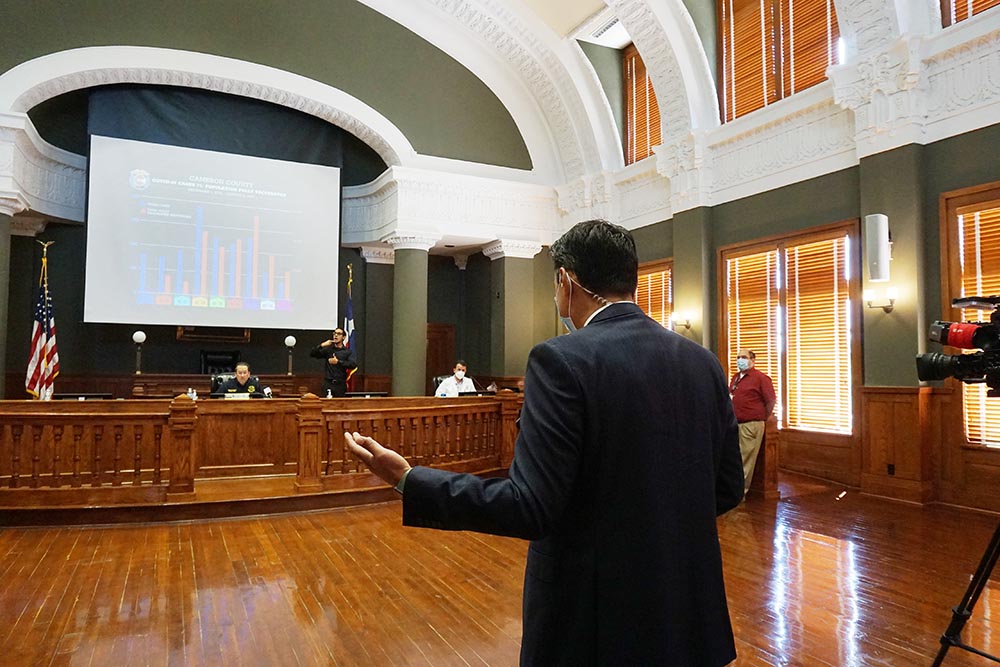As the highly contagious delta variant of COVID-19 sweeps across the Rio Grande Valley, Cameron County officials and health care leaders are issuing increasingly urgent pleas to members of the public who have not been vaccinated to do so.
Speaking at a Monday press conference, Cameron County Public Health Authority Dr. James Castillo said delta likely accounts for 90% of cases regionally and that “it went from zero to 90 probably in a month.”
As of Monday, the county had reported a total of 45,467 cases, up from 42,119 on June 28. The number of county residents who have died because of COVID-19 during the pandemic was 1,719 as of Monday, with 34 additional deaths since June 28.
Castillo said that unlike earlier strains delta does not spare children. While children could catch earlier versions of COVID-19, they tended not to be contagious to family members, he said.
“Delta is changing that,” Castillo said.
If family members are vaccinated, however, there’s a very small chance they will end up in the hospital, and that’s because of the effectiveness of vaccines in preventing symptoms from becoming severe enough to require hospitalizations, he said.
“If you have kids at home the best thing you can do to protect them is for you yourself to be vaccinated,” Castillo said.
Delta is spreading rapidly mostly among younger people who are also the least vaccinated segment of the population, and it’s just a matter of time before young people start dying from it, he said. The Valley’s hospitals had 508 COVID patients as of Aug. 9, 175 of them in Cameron County hospitals, Castillo said, noting that that number is fast approaching the number of people hospitalized for COVID during the winter surge, when 725 people across the Valley and 250 county residents were hospitalized during the peak.
Nearly 100% of current COVID patients are unvaccinated, he said.
“That’s a massive increase, and the difference this time around is the people in the hospitals are younger and thought they were healthy,” Castillo said. “They thought they didn’t need the vaccine because they’re young and healthy.”
Once a person is sick enough to be hospitalized, it’s too late for the vaccine to have any effect. Delta’s symptoms are a bit different than earlier strains of the virus, and include headache, nasal congestion, runny nose and sore throat, he said.
“The loss of smell tends to kick in a few days later,” Castillo said, adding, “if you’re sick it’s probably COVID.”
“Get tested,” he said. “Isolate. Stop spreading it around.”
Monoclonal antibody therapy, which can reduce the chances of being hospitalized or dying, are difficult to get but available to those with risk factors, Castillo said. That includes most of the population including young people, he said.
“All it takes is being a little bit overweight,” Castillo said.
Anyone who suspects they have COVID should contact their primary care physician rather than going to the emergency room and infecting others. Those without a primary care physicians should contact the county, he said.
While the county’s vaccination numbers are good they’re still not good enough, which is why delta is infecting so many county residents and hospitals are again seeing COVID patient loads reach crisis levels. Without the staffing assistance provided through the state last year, hospital workers are stretched even thinner than last year.
Castillo reported that 94 percent of county residents 50 to 64 years old are fully vaccinated, though only 64 percent of those 16 to 49, and just 41 percent of those 12 to 15, have received both shots.
“Delta will spread so efficiently that the unvaccinated people in this age group are getting it very, very fast,” he said.
In many cases husbands and wives are being hospitalized at the same time, Castillo noted.
Since fully vaccinated people may still be able to catch and transmit delta, though the vaccine greatly reduces the odds of serious symptoms, it’s important to continue wearing masks in public, he said.
“I know some people have politicized masks” Castillo said. “Masks work. They do work. We need to wear them. We need to wear them when we’re around each other in public.”
Although Gov. Greg Abbott has ordered that it’s up to parents to decide whether their child wears a mask back to school, Castillo said that “it should not be an option.”
“I know the policy from the state is parent preference,” he said. “Hey, we don’t have parent preference on car seats. … We have laws that say you’ve got to keep your kids safe. It’s not a parent preference.”
At the same time, it’s important for kids to go back to school, though a vaccine for children under 12 isn’t likely until late this year, Castillo said.
“If your kid is going back to school and they’re eligible, get them vaccinated,” he said. “If they’re going back to school, you tell them they are wearing a mask. And please support your school’s leadership in this. Just because the state is not going to force people to do it doesn’t mean it’s not right. That’s how we’re going to help protect our kids.”





